The Great Lakes I-Corps Hub is celebrating Women’s History Month by recognizing the women of I-Corps. Read below to learn about 6 women I-Corps participants, their journeys to where they are today, and how I-Corps programs contributed along the way.
Learn more about the Great Lakes I-Corps Hub on our website, and get involved as a participant, mentor, or instructor.
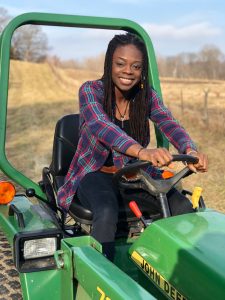 Dr. S. Bianca Bailey, PhD, Founder of Agriwater Corp.
Dr. S. Bianca Bailey, PhD, Founder of Agriwater Corp.
An engineer by training, Dr. S. Bianca Bailey is using her technical skills, interest in entrepreneurship, and passion for solving global water issues, including water treatment and quality, to help farmers turn poop into clean water and profit as founder of the Agriwater Corp.
Before launching her startup, Dr. Bailey took advantage of the entrepreneurial ecosystem at University of Illinois Urbana-Champaign during her PhD program, attending I-Corps, a business plan competition, and a student accelerator program.
“I-Corps helped determine the addressable market that we wanted to focus on,” Dr. Bailey said, also noting that I-Corps methodology was prevalent throughout several of her accelerator programs. “Every time I got more defined on what my customer looked like.”
Agriwater is designing a mobile wastewater treatment system for livestock or animal farmers.
“We want farmers to have the capacity to treat their animal waste and receive a product after treatment, which is organic fertilizer, clean water, and carbon credits that they can use on the carbon market,” Dr. Bailey said.
Dr. Bailey and Agriwater are currently in the process of scaling up their technology, and hope to pilot with a small hog or dairy farmer in the near future.
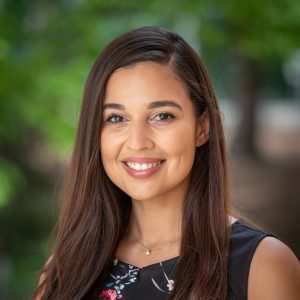 Safa Jabri, PhD Candidate and Graduate Research Assistant in the Sienko Research Group at University of Michigan
Safa Jabri, PhD Candidate and Graduate Research Assistant in the Sienko Research Group at University of Michigan
Safa Jabri, a mechanical engineer by training and a PhD candidate and graduate assistant at the University of Michigan, has always wanted to make a human impact with her research.
For Jabri, “it is not just technology for the sake of it being cool or innovative or cutting edge, but rather there were humans at the other end of the transaction, and those peoples’ lives were being made better by the technology. For me that is a big driver for what I want to work on in life.”
This desire for impact led her to a Regional I-Corps program along with a team from her lab of 3 advisors and another graduate student. The team was examining ways to use technology to make physical therapy rehabilitation processes more accessible and more quantifiable.
“It was super exciting when we got the opportunity to do I-Corps,” Jabri said. “That was something I was looking forward to because I was thinking a lot about performance aspects of my projects, but not truly spending structured time about how it could be received by an actual user or stakeholder, and that was really interesting.”
Jabri is going into the 4th year of her PhD program and considering a career in industry R&D. She noted that I-Corps gave her a more grounded view of her research in a context outside of academia.
“This has moved from being an intellectual or scientific exercise to thinking about it beyond the lab,” Jabri said. “It is really easy to get caught up in the experiment or laboratory based approach, and by going through the process of talking to people who would eventually be your target users, it helps you design for outside the lab, and think about building your technology to be used outside of the lab.”
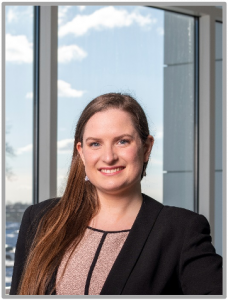 Lindsey Roddy, RN – CEO and Founder of Roddy Medical Inc. and PhD student at UW-Milwaukee
Lindsey Roddy, RN – CEO and Founder of Roddy Medical Inc. and PhD student at UW-Milwaukee
A nurse for almost a decade, Lindsey Roddy’s career trajectory changed when two professors in her PhD program asked her a simple question: “What are your ideas, Lindsay?”
Roddy, now the CEO of Roddy Medical, immediately thought of a previous patient, whose life support IV line was accidentally pulled out as he was getting out of bed after surgery.
Roddy’s product, the SecureMove-TLC, prevents accidental line pull-outs for patients and provides a better way to manage and secure critical medical lines and tubes. Though Roddy’s team is now in the selling stage of their product, Roddy participated in a student startup challenge and a local Milwaukee I-Corps program, conducting over 300 customer interviews, to get to this stage.
“People are excited about the SecureMove-TLC because it was designed around their pain, their need. They were engaged in the development process, giving their feedback,” Roddy said. “Now, we are engaging with the hospitals that I was talking to during I-Corps and these programs. So, now, it comes full circle.”
Though Roddy is full-time at her company now, she is still pursuing her PhD, and even picks up a nursing shift or two when she has the chance. With industry, academic, and nursing experience under her belt, Roddy is out to improve the healthcare system.
“How do we help really bring things from the frontlines of healthcare, from the diverse, dynamic experience of these healthcare providers, and how do we get those ideas commercialized,” Roddy said. “How do we bring these good things forward to help patients and our system, because there is room for improvement.”
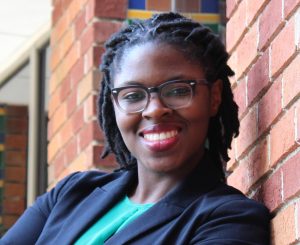 Elisabeth Michel, MPH, Health Equity Operations Specialist at Hartford HealthCare
Elisabeth Michel, MPH, Health Equity Operations Specialist at Hartford HealthCare
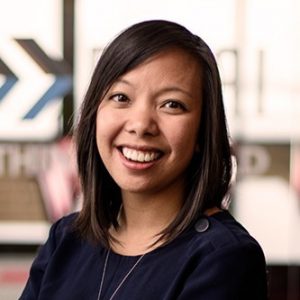
Ann Duong, MSHI, Senior Strategic Designer at BCG Digital Ventures
Elisabeth Michel and Ann Duong met in Rwanda in 2016 during their respective fellowship programs, working and living together for 4 months. When they both ended up at graduate school at the University of Michigan – Michel for a Master’s in Public Health and Duong for a Master’s in Health Informatics – they took advantage of the opportunity to leverage their skills and passions to co-found a company in 2017.
While at the University of Michigan, Michel, Duong, and their third co-founder, Brandon Keelean, participated in the TechArb Student Accelerator program and I-Corps to accelerate their idea that eventually became Canopy – a web application that helped people talk about, make, and share end-of-life healthcare decisions.
“I-Corps really emphasized customer discovery, and I know a lot of times as a newer entrepreneur, it can be scary to go talk to people,” Duong said. “Being able to learn those skills early on through the I-Corps program, and understand what questions you should ask, how you should ask them, and how you should write a discussion guide was a really helpful thing to be able to learn through I-Corps. And, it really helped us continue to understand those challenges in the population we were trying to serve.”
One of the memories that stands out for Michel when it comes to TechArb and I-Corps was community.
“You have this built-in network of folks that you can ask questions, test out ideas, provide feedback, get feedback – people who understand the journey of an entrepreneur,” Michel said. “Family love us and they support us, but it is different when you are able to talk to somebody who understands the pain point of ‘I reached out to 200 people today and nobody responded.’”
Though Canopy was sunsetted at the end of 2020, both Michel and Duong are still pursuing their passions in different roles. Both Michel and Duong relayed that they learned a lot from their experience co-founding Canopy.
“The advice I give to individuals who are wanting to start their own thing is to take the first step, but the idea that you have in your head, that is not what it is going to look like in a year,” Duong said. “This is a learning process, and you are going to continue growing and learning, and that is the beauty of entrepreneurship and the most exciting thing about it at least for me.”
When it comes to Michel’s advice for folks considering the entrepreneurship route, Michel noted that fear is real in entrepreneurship but that “Will Smith said it best when he said ‘Do it scared.’”
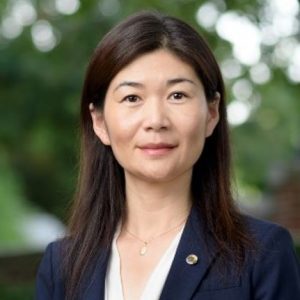 Dr. Luna Lu, Director of Office of Professional Practice at Purdue University, ACPA Professor at Lyles School of Civil Engineering at Purdue University, Director of Center for Intelligent Infrastructure at Purdue University, and Founder of Wavelogix
Dr. Luna Lu, Director of Office of Professional Practice at Purdue University, ACPA Professor at Lyles School of Civil Engineering at Purdue University, Director of Center for Intelligent Infrastructure at Purdue University, and Founder of Wavelogix
Dr. Luna Lu always knew she wanted to be an innovator. Now, in her role as an accomplished researcher, professor, and director at Purdue University, plus 3-time I-Corps participant, Dr. Lu gets to do just that.
One of her most recent endeavors involves creating IOT sensing technology that measures material strength development over time and sends data to engineers, construction teams and others to tackle the problem of aging infrastructure.
In 2020, when she learned that major construction companies were interested in her technology, she knew she needed to complete I-Corps before moving forward.
“At that point, the technology was still in the lab stage,” Dr. Lu said. “So we developed the technology and tested the viability in that lab, but how it would perform in the field was not understood. So, we thought let’s do NSF I-Corps to understand what is the potential of the technology and is there a technology-market fit.”
Dr. Lu’s company that was spun-off from this research, Wavelogix, is planning for beta testing with several state departments of transportation, and a product launch in the second quarter of this year. Dr. Lu notes that I-Corps was a critical step in the company’s success.
“I-Corps is fundamentally critical to university professors,” Dr. Lu said. “At universities and as academics, we reward ideas. If you have an idea, you get a proposal, money, papers. However, industry rewards execution. How can you bring that idea into a product, and from the product, capture the interested market. The two different worlds speak different languages, but I-Corps can help us bridge that disconnect.”
